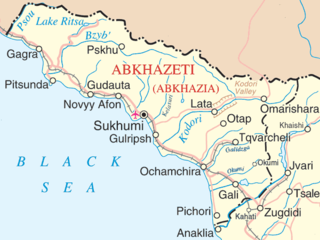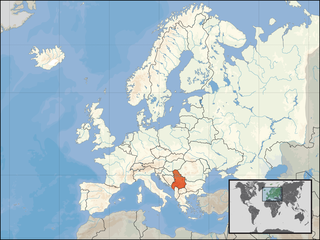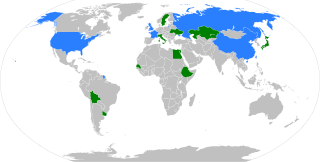
The United Nations General Assembly, UNGA; French: Assemblée générale des Nations unies, AGDNU is one of the six principal organs of the United Nations (UN), serving as its main deliberative, policymaking, and representative organ. Currently in its 79th session, its powers, composition, functions, and procedures are set out in Chapter IV of the United Nations Charter.

The member states of the United Nations comprise 193 sovereign states. The United Nations (UN) is the world's largest intergovernmental organization. All members have equal representation in the UN General Assembly.

A United Nations Security Council resolution (UNSCR) is a United Nations resolution adopted by the Security Council (UNSC), the United Nations (UN) 15-member body charged with "primary responsibility for the maintenance of international peace and security".
A United Nations General Assembly resolution is a decision or declaration voted on by all member states of the United Nations in the General Assembly.

A United Nations resolution is a formal text adopted by a United Nations (UN) body. Although any UN body can issue resolutions, in practice most resolutions are issued by the Security Council or the General Assembly, in the form of United Nations Security Council resolutions and United Nations General Assembly resolutions, respectively.

The United Nations Security Council veto power is the power of the five permanent members of the UN Security Council to veto any decision other than a "procedural" decision.
United Nations General Assembly (UNGA) resolution 377 A, the "Uniting for Peace" resolution, states that in any cases where the Security Council, because of a lack of unanimity among its five permanent members (P5), fails to act as required to maintain international security and peace, the General Assembly shall consider the matter immediately and may issue appropriate recommendations to UN members for collective measures, including the use of armed force when necessary, in order to maintain or restore international security and peace. It was adopted 3 November 1950, after fourteen days of Assembly discussions, by a vote of 52 to 5, with 2 abstentions. The resolution was designed to provide the UN with an alternative avenue for action when at least one P5 member uses its veto to obstruct the Security Council from carrying out its functions mandated by the UN Charter.

The Security Council of the United Nations passed 32 resolutions where it recognizes Abkhazia as an integral part of Georgia and supports its territorial integrity according to the principles of the international law. The UN is urging both sides to settle the Georgian–Abkhazian conflict through peaceful means by intensifying diplomatic dialogue and ratifying the final accord about the status of Abkhazia in the Georgian Constitution. Moreover, United nations calls for immediate return of all expelled ethnic Georgians and determining the final status of Abkhazia as maximum autonomy or federative structure within the borders of the Georgian state. The resolutions also commend Russia's role as a peacekeeper and facilitator towards a resolution of the conflict. Resolution 1716 also urges Georgia to ensure that no troops are present in the Kodori Gorge and asks Georgia to refrain from provocative actions in the Kodori Gorge.
The following outline is provided as an overview of and topical guide to the United Nations:

United Nations Security Council resolution 777, adopted unanimously on 19 September 1992, after reaffirming Resolution 713 (1992) and all subsequent resolutions on the topic, the Council considered that, as the state known as the Socialist Federal Republic of Yugoslavia (SFRY) had ceased to exist, it noted that under Resolution 757 (1992), the claim by the Federal Republic of Yugoslavia to continue automatic membership in the United Nations was not widely accepted and so determined that membership of the SFRY in the United Nations could not continue. Therefore, the Council recommended to the General Assembly that the Federal Republic of Yugoslavia cease participation in the General Assembly and apply for membership in the United Nations.

United Nations Security Council resolution 821, adopted on 28 April 1993, after reaffirming Resolution 713 (1991) and all subsequent resolutions, the council also recalled resolutions 757 (1992), 777 (1992) and General Assembly Resolution 47/1 (1992) which stated that the state formerly known as the Socialist Federal Republic of Yugoslavia had ceased to exist and that it should apply for membership in the United Nations and until then should not participate in the General Assembly.
United Nations Security Council resolution 860, adopted unanimously on 27 August 1993, after recalling resolutions 668 (1990), 745 (1992), 840 (1993) and other relevant resolutions on Cambodia, the Council confirmed plans for the withdrawal of the United Nations Transitional Authority in Cambodia (UNTAC).

United Nations Security Council resolution 1314 was adopted unanimously on 11 August 2000, after recalling Resolution 1261 (1999) on children and armed conflict and other resolutions including 1265 (1999), 1296 (2000) and 1306 (2000). The Council expressed concern at the impact of conflict upon children and the use of child soldiers, and expressed willingness to consider further measures under the United Nations Charter when dealing with situations of children in armed conflict.

The 2016 United Nations Security Council election was held on 28 June during the 70th session of the United Nations General Assembly, held at United Nations Headquarters in New York City. The elections were for five non-permanent seats on the UN Security Council for two-year mandates commencing on 1 January 2017. In accordance with the Security Council's rotation rules, whereby the ten non-permanent UNSC seats rotate among the various regional blocs into which UN member states traditionally divide themselves for voting and representation purposes, the five available seats were allocated as follows:

The eleventh emergency special session of the United Nations General Assembly opened on 28 February 2022 at the United Nations headquarters. It addresses the Russian invasion of Ukraine. Maldivian politician Abdulla Shahid served as President of the body during this time.

United Nations Security Council Resolution 2623 called for the eleventh emergency special session of the United Nations General Assembly on the subject of the 2022 Russian invasion of Ukraine. Albania and the United States introduced the resolution before the United Nations Security Council, which adopted it on 27 February 2022. Russia voted against while China, India and the United Arab Emirates abstained. As this was a procedural resolution, no permanent member could exercise their veto power.

United Nations General Assembly Resolution ES‑11/1 is a resolution of the eleventh emergency special session of the United Nations General Assembly, adopted on 2 March 2022. It deplored Russia's invasion of Ukraine and demanded a full withdrawal of Russian forces and a reversal of its decision to recognise the self-declared People's Republics of Donetsk and Luhansk.

United Nations General Assembly Resolution ES‑11/2 is the second resolution of the eleventh emergency special session of the United Nations General Assembly, adopted on 24 March 2022, following Resolution ES-11/1 which was adopted on 2 March 2022. Resolution ES‑11/2 reaffirmed the UN's former commitments and obligations under its Charter, and reiterated its demand that Russia withdraw from Ukraine's recognized sovereign territory; it also deplored, expressed grave concern over and condemned attacks on civilian populations and infrastructure. Fourteen principles were agreed.

United Nations General Assembly Resolution ES‑11/4 is the fourth resolution of the eleventh emergency special session of the United Nations General Assembly, adopted on 12 October 2022, following Resolution ES-11/3 which was adopted on 7 April 2022.














